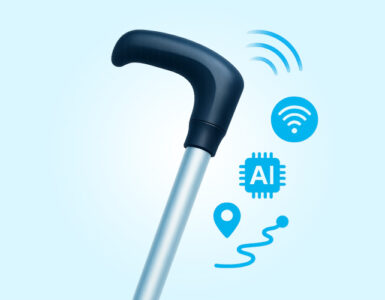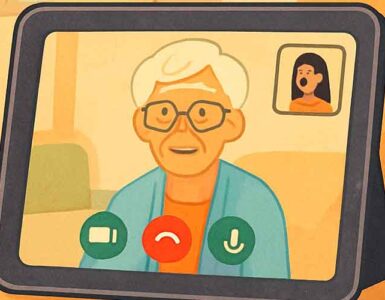Life Alert VS Medical Guardian: Two popular medical alert systems compared
Two of the most popular and well-publicized medical alert systems are Life Alert and Medical Guardian. Both offer comprehensive services, yet differ in particulars of gear, function, and cost. In this article, we pit Life Alert VS Medical Guardian and take a look at how these two popular medical alert systems compare to each other.
Life Alert versus Medical Guardian: Overview
A well-designed medical alert system provides peace of mind to families and caregivers, and allows the disabled person the opportunity to live a more independent life with a higher degree of autonomy. Medical alert systems provide three primary functions that enable those outcomes.
- Emergency response: At the heart of any medical alert system is emergency response. When the user presses their emergency button – whether on a pendant, wristband, or other – they should expect quick communication with the service’s agents, who can then summon help as necessary.
- Extended notifications: In addition to notifying alert system staff, it’s often desirable for family members or caregivers to be looped in when an alert is sounded, or to be able to access information about the client’s current activity levels.
- Activity monitoring and fall detection: Fall detection devices are usually optional with medical alert systems, but can provide peace of mind when falls are a concern. Activity monitoring systems can also be added to track the disabled person’s movement, a useful way to monitor activity levels.
Devices Compared
Monitoring for medical alert systems is accomplished through the use of several pieces of hardware. All systems employ a base station that links wirelessly to a pendant, clip-on device, or wristband worn by the disabled person. When the device is activated in the home, an alert is relayed through to the alert systems response team, via either a phone landline or a cellular link from the base station.
- Medical Guardian: Medical Guardian’s gear options include conventional pendants, and even a wearable smartwatch, with ranges of up to 1,300 feet depending on the selected device. The water resistant devices work with a base unit, and available add-ons include wall-mount buttons, fashion pendants and a car charger. Landline and cellular options are available. In addition to dedicated hardware, Medical Guardian offers a useful mobile app that works with the system to assist the disabled person with scheduling for medications and other tasks. Medical Guardian offers a lockbox service, so first responders will be able to quickly enter the house in the event of an emergency.
- Life Alert: Life Alert pendants provide two-way communication with the response center when the disabled person calls for help. It works via a satellite system and has a range of 800 feet from the master unit, which is about the size of a clock radio. The master unit is pre-programmed with personalized information and offers 10x voice amplification so it can be heard throughout the house. The pendant can be worn 24 hours per day on the neck or wrist and features an activation button. Life Alert devices are waterproof and can be worn in the shower, and additional Help Buttons can be placed throughout the house in high-risk areas. Home intrusion and fall detection options are offered.
Emergency Response and Notifications
Emergency response is the primary reason for the use of medical alert systems. The medical issues associated with a disability require a prompt response in the event of a medical emergency. This essential service is key to allowing the disabled person to have the highest degree of independence in their own home. Activity monitoring provides a non-intrusive look at the activity level of the disabled person.
- Medical Guardian: Medical Guardian staff get high marks for professionalism. Depending on the nature of the emergency, staff will reach out to designated contacts in the client’s Circle of Care before automatically notifying emergency services. Medical Guardian’s mobile app keeps loved ones and caregivers in the loop by providing daily and weekly snapshots of activity levels.
- Life Alert: Life Alert is well-regarded for its excellent customer service, and boasts a high ratio of emergency staff to clients. Clients can expect a response within about 20 seconds, and they receive excellent reviews for the training that their responders receive. You can provide medical history records to Life Alert so that they can communicate useful information to emergency personnel.
Costs, Contracts, and Installation
There are several parts to the cost of a medical alert system. First is the monthly cost, which will vary depending on the level of services and options offered. In addition, some systems require a long-term contractual commitment, rather than a month-by-month renewal. Installation of the system may also require additional charges.
- Medical Guardian: Medical Guardian offers several tiers of service plans, starting at $29.95 per month for Classic Guardian, which requires a landline. Home Guardian offers cellular connectivity and costs $34.95 per month. Family Guardian offers activity monitoring, a mobile app and daily reports and notifications to family members or caregivers for $79.95 per month. Mobile Guardian is $49.95 per moth and features built-in GPS and AT&T cellular service for people on the go. Active Guardian offers offers WiFi location and comes in at $44.95 per month. Equipment costs are included in the monthly cost, so there’s no additional charge for equipment (except for the Freedom Guardian smartwatch, which carries a $179 base price and costs $44.95 per month). Professional installation of the equipment is not required.
- Life Alert: Life Alert is not transparent on their pricing, and you’ll have to call to get a quote or compare services. The protection at home only plan costs $49.95 per month, carries a $95 enrollment fee and requires a long-term 36-month contract. Protection at home plus GPS protection out of home with a bathroom help button costs $89.95 per month and has a $198 enrollment fee. Additional services, like fall detection, will bump up the monthly cost of the plan. Equipment costs are extra, and Life Alert promotes professional installation of the equipment – an upfront expense.
Life Alert VS Medical Guardian: The Bottom Line
Both Life Alert and Medical Guardian are well-respected medical alert services, and do a fine job providing the essentials of rapid response and reliable equipment. If you value more options in types of coverage and desire activity monitoring as an essential part of the service, Medical Alert is an excellent choice. Given Life Alert’s long-term track record they provide a slight advantage in customer service. In price, Medical Alert offers less expensive service options with lower setup fees and no required long-term contracts. In short, if years of experience and a trusted brand name is important, Life Alert is an excellent option. If more advanced tech and affordable price are key, choose Medical Guardian.






























Add comment